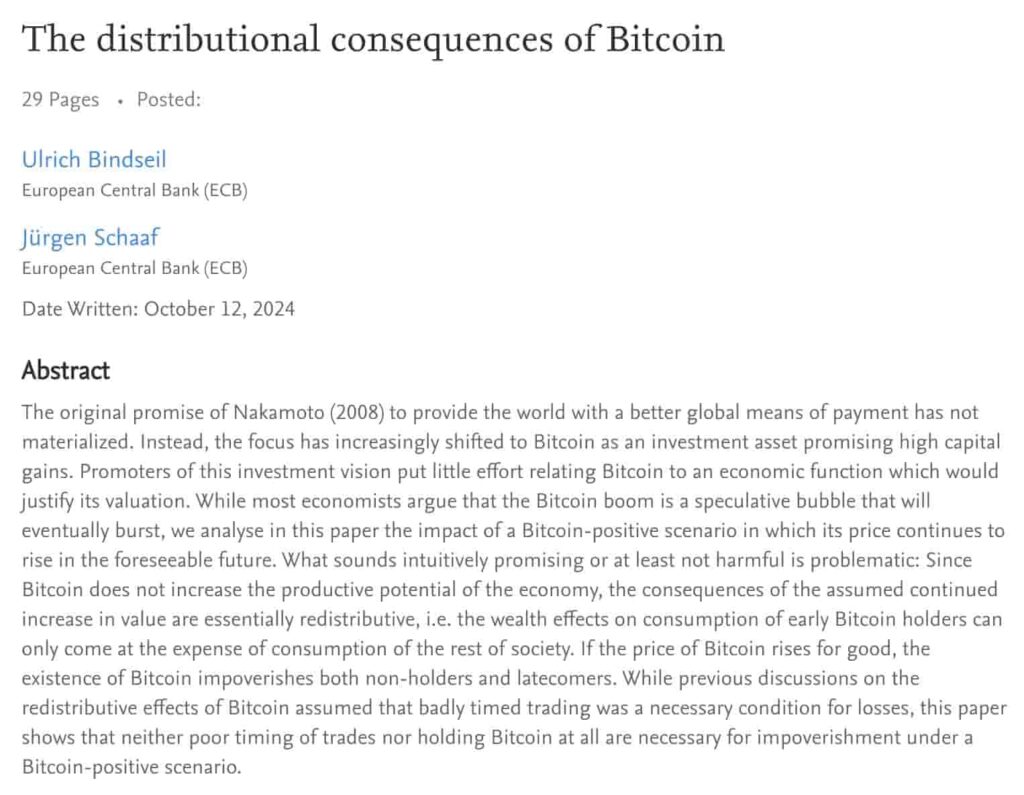The European Central Bank (ECB) strikes again, publishing an economic paper about Bitcoin (BTC) called “The distributional consequences of Bitcoin.” Analysts have called it a “declaration of war” on Bitcoin or “one logical leap away” from the ECB acquiring BTC.
However, the European Central Bank gives no signals of intention to buy BTC at any point in time. Instead, this paper, written by Ulrich Bindseil and Jürgen Schaaf, raises harsh economic criticisms of Bitcoin’s value proposition, even when considering a bullish scenario where BTC price rises continuously despite what contrarian analysts believe is a speculative bubble.
Analyzing it further, Tuur Demeester called the recent paper a “true declaration of war” with potential negative consequences. The long-term Bitcoin analyst believes it can fuel more active harmful measures against BTC as an investment asset in Europe.
As highlighted in a related story by DLNews, Italy has already shown part of what could be next for Bitcoin. The European country recently announced a BTC capital gain tax hike from 26% to 42%, which disincentives Bitcoin price speculation. In the United States, presidential candidate Kamala Harris also defends increased capital gain taxes for stocks and cryptocurrencies.
ECB’s paper: ‘The distributional consequences of Bitcoin’
Indeed, the European Central Bank economists Bindseil and Schaaf wrote the “The distributional consequences of Bitcoin” paper on October 12. This was just another piece of content from two ECB names that have previously published other articles criticizing Bitcoin.
As Finbold reported, the ECB warned that Bitcoin was on a “road to irrelevance” in 2022 and called BTC ETFs “the naked emperor’s new clothes” in 2024.
The economists explained how Bitcoin shifted from Satoshi Nakamoto‘s original vision to an investment asset promising gains for all buyers. As described, this shift unbacked by a real economic value proposition other than its speculative appeal arguably makes Bitcoin a financial “bubble that will eventually burst.”
European Central Bank’s Steelman argument on Bitcoin
Yet, the current paper focuses on what BTC promoters envision as the best-case scenario, considering continuous price rallies upwards. On that note, Jameson Lopp, co-founder and CSO of CasaHODL, believes the ECB validates the speculative promoted appeal it opposes.
In an X post on October 19, Lopp highlighted the excerpt, “If the price of Bitcoin rises for good (…).” Ironically, this stance is precisely what the European Central Bank previously described as the core narrative used to promote Bitcoin.
“The ECB is one logical leap away from realizing they need bitcoin on their balance sheet.”
– Jameson Lopp
Interestingly, both the ECB’s approach against Bitcoin and Lopp’s commentary use a debate technique called the “Steelman argument.” In a steelman argument, the part considers its adversary’s best possible argument true, expanding on its potential consequences.
From an ECB’s perspective, what Bitcoin promoters see as a positive aspect could have a wealth redistribution effect. This effect would punish both non-holders and latecomers for the benefit of early buyers – an argument Jameson Lopp also explored.
“What sounds intuitively promising or at least not harmful is problematic: Since Bitcoin does not increase the productive potential of the economy, the consequences of the assumed continued increase in value are essentially redistributive, i.e. the wealth effects on consumption of early Bitcoin holders can only come at the expense of consumption of the rest of society.”
– European Central Bank
It goes further by adding that this wealth redistribution would affect not only “badly timed trading” but the entire society – and even BTC holders – with “impoverishment” in a “Bitcoin-positive scenario.”
European Central Bank declares war on Bitcoin
Such an extreme positioning raised alarms in the Bitcoin community, suggesting European authorities may use this paper to approve extreme measures against the cryptocurrency in the continent. Indeed, the European Union has already declared war on financial privacy, harming Monero’s (XMR) availability in the region.
Tuur Demeester found some concerning proposals in the piece that encourage the creation of legislation to manipulate Bitcoin prices downwards. Such market manipulation techniques exist in financial markets, as Finbold reported yesterday on FTX activities to intentionally harm some cryptocurrencies.
As Demeester highlighted, the European Central Bank openly advocated to interfere in the free market, aiming to make BTC disappear. Essentially, the paper indeed consists of an economic declaration of war on Bitcoin, openly encouraging market violations powered by laws.
“In any case, non-holders should realize they have compelling reasons to oppose Bitcoin and advocate for legislations against it, aiming to prevent Bitcoin prices from rising or to see Bitcoin disappear altogether.”
– European Central Bank
Therefore, Bitcoin investors and enthusiasts must closely follow further developments in the European Union, which could have a direct – and even intentional – negative effect on BTC’s price.

